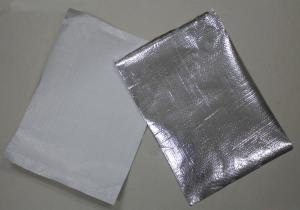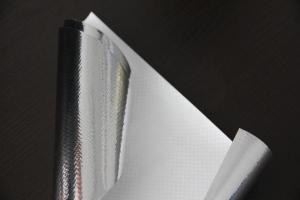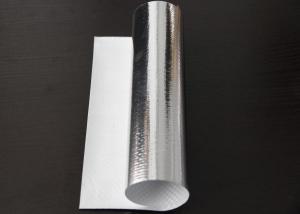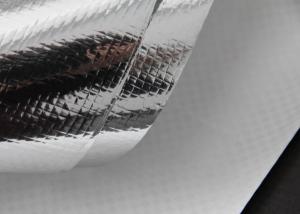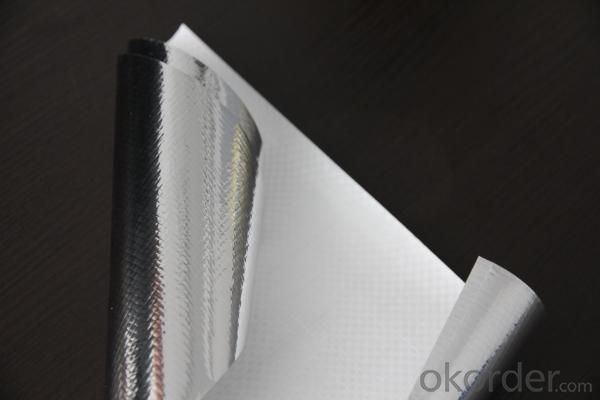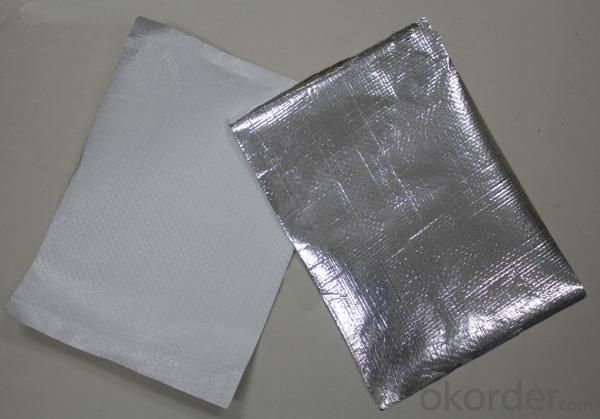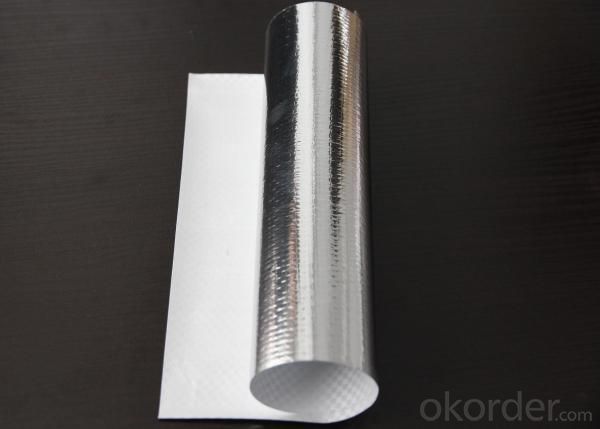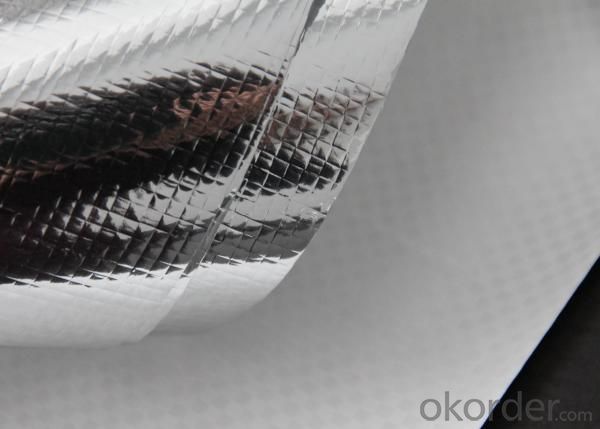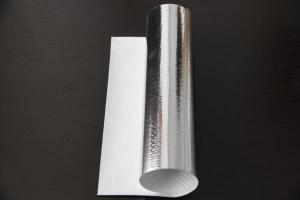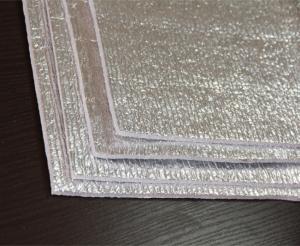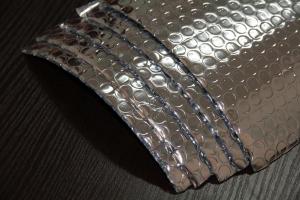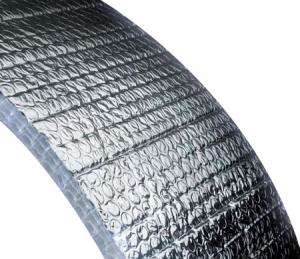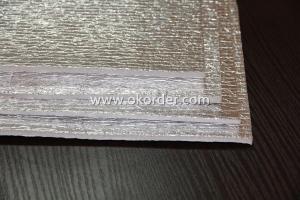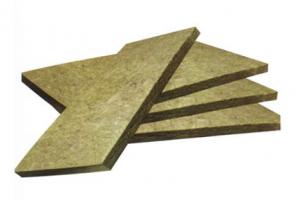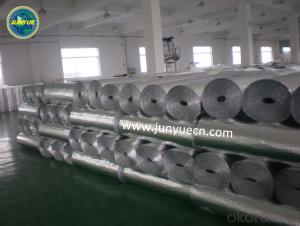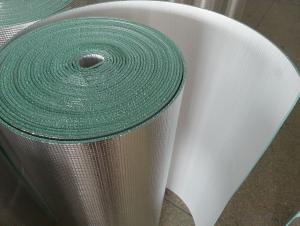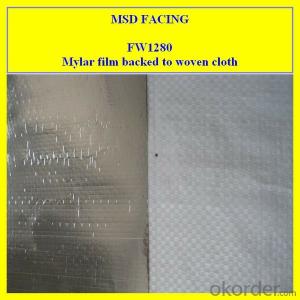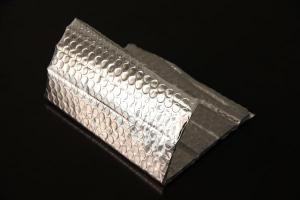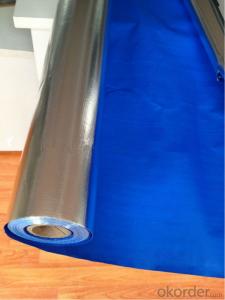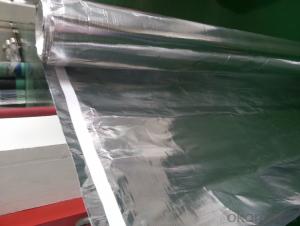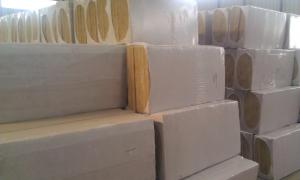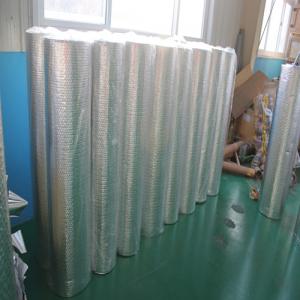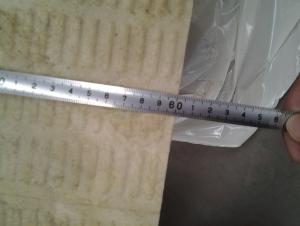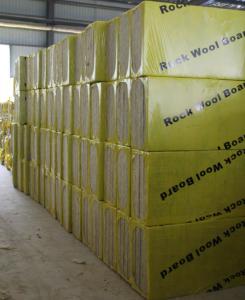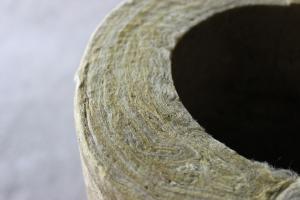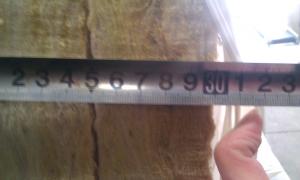Fanfold Roofing Insulation Woven Film MPC
- Loading Port:
- China Main Port
- Payment Terms:
- TT or L/C
- Min Order Qty:
- 10000M2 m²
- Supply Capability:
- 20000M2 Per Day m²/month
OKorder Service Pledge
OKorder Financial Service
You Might Also Like
1. Specification of Woven Film
Aluminum foil: Metallizedpolyester: 12u / Polyethylene / Polyethylene Woven Fabric/Aluminum foil: 7u
TYPICAL PHYSICAL PROPERTIES:
|
PROPERTIES |
UNIT |
VALUE |
TEST METHOD | ||||
|
Basic weight |
gsm |
140 |
ASTM D646 | ||||
|
Tensile strength: M. D. X. D. |
N/25mm |
450 450 |
ASTM C1136 | ||||
|
Burst strength |
N |
150 |
ASTM D774 | ||||
|
Reflectivity of foil surface |
% |
95 |
---------- | ||||
|
Temp. Resistance |
-29°C +66°C |
No change keep soft |
ASTM C1263 | ||||
|
Water vapor permeance |
ng/N.s |
1.6 |
ASTM E-96 | ||||
|
Water Soak Test |
24hrs |
No delamination |
---------- |
Width: 1.2m, 1.25m, 1.3m
Length: 60m, 100m, 120m
Core I.D.: 3"(76mm ±1)
Based on order, special sizes are also available.
Remarks:
(1).The data above are typical results and subject to change without notice.
(2).Tolerance: Weight and Thickness: ±10%; Width: ±3mm; Length: Cut Roll & Log Roll ±0.3m, Jumbo Roll ±0.5%.
(3).The products should be stored at room temperature and kept from wet and heat source.
(4).It is essential, as with all pressure-sensitive tapes, that the surface to which the tape is applied must be clean, dry, and free of grease and oil.
(5).The user should take test and do trial-application on the above products before coming into application so as to witness and ensure suitability for user’s special purpose and technique.
2. Application of Woven Film
Foil facing is mainly used for duct wrap in HVAC sustem and other fields, such as vapor barrier etc., and suitable for off-line lamination of glass wool or rock wool. By special processing, the facing will have excellent flame retardant property.
3. Packaging & Delivery of Woven Film
Depends on the clients' requirements and the production conditions.
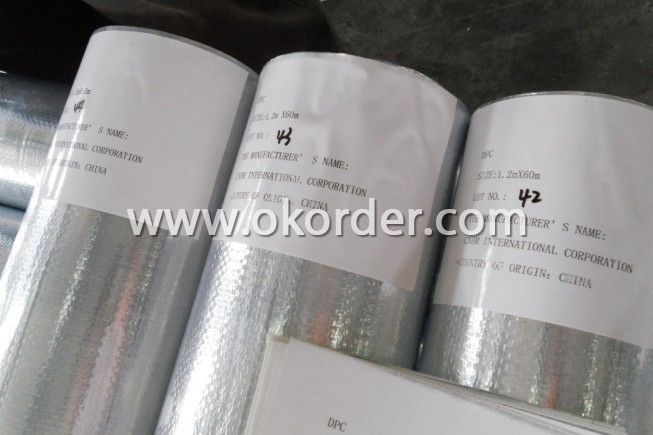
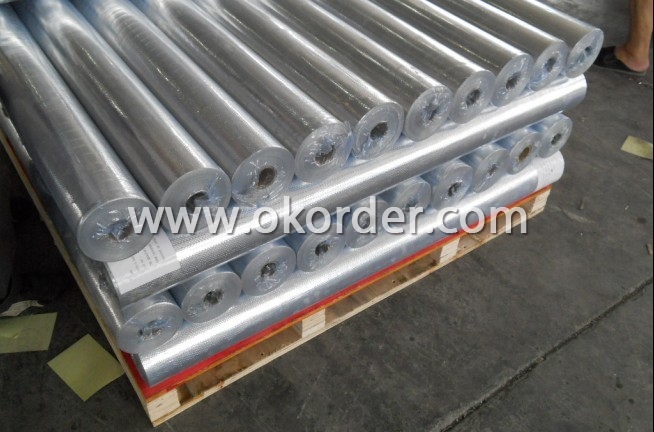
- Q: As opposed to other roof structures, such as Mansard or Hipped roofs. If so, is it because there is a lesser distance between the internal heat source and the roof?
- Hm. Tough one. Could be. I would think because there is less surface area.
- Q: I live in central florida. I plan on installing R-30 insulation to the floor of my attic. How effective is it to install reflective insulation to the attic on the roof side? Is it worth the price?
- No dont add to the roof. The under side of the roof needs air flow and you will trap moisture, causing mold and rot. Make sure you have plenty of vents under your eaves and take your extra money and buy a solar powered attic fan (or 2 ) Mark
- Q: I need to call around and find a contractor to repair my roof. I thought it might be a good idea to at least have the name of this type of roofing correct so I don't sound like too much of a mark. Thank you in advance for your assistance.
- Spray foam insulation.
- Q: ... building code max. (R-50)???
- Anytime snow melts from a roof due to lost heat from the interior, or sun shining on the roof, but air is below freezing, icecycles will form. The real danger here is ice cycles that can fall when thawing and kill in extreme cases, AND ice dams can form forcing ice back up under shingles damaging roof. That is why it is often a good idea to install heat tape under the edge of roofs in areas that are prone to heavy freezes and snow.
- Q: Our end unit 1940"s row house has an old leaking bitumen roof . The water entry point can not be found so a replacement seems the way to go. A roofer suggested a replacement using Firestone 180, 1/2 inch fiberboard insulation covered with fiberglass base sheet, bitumen for flashing and fibered aluminum coating on wall coping . It's all Greek to be but fiberboard insulation and flashing material ? Should I be concerned?
- We use kingspan insulation, marine grade plyboard , 3/4 inch, and yes you can use bitumen as flashing. I hope i am not being condescending, but the flashing is the bit that goes from the roof and a little way up the wall and is then "pointed" into the bricks, thus forming a water-proof barrier.
- Q: on a traditional pitched roof construction,where is heat insulation usually provided?
- Generally, the insulation is blown in loose fiberglass to around 14 inches -- R 38, between the ceiling joists. Radiant barrier roof decking is often used in conjunction with this method, along with excellent attic ventilation to allow heat to escape. Sometimes, with foam insulation in new construction, the foam is installed between rafters, to create air conditioned attic. This is much more expensive, but if done right, can result in greatly lowered energy consumption. This method requires outside air having a way to get into the home, requires special AC and heat equipment, and if the wall insulation and window package aren't up to snuff, much of the effect is lost, resulting in wasted money -- tens of thousands of dollars, literally.
- Q: We have recently moved into a house in Australia with a tin roof. There is a layer of 5cm batts on the rafters in the roof space, but the temp is 10-15 degrees C higher up there than in the house (with all the windows and doors open). I don't want to get air-conditioning, is there another way to insulate the roof and cool the house?
- like they said ventilation is the answer... you allready have a radiant barrier ( metal roof ), now get the heat out. a rigge vent would be best with plent of open soffit all the way around the perimeter. if you're in a dry climate, a humidifier will work as well as an a/c, but much cheaper! give measurments in feet & inches... what do you thing, some one from france is going to help you?
- Q: a roof that is built with the insulation covering the waterproof membrain is ?
- a foolish product of college education in the building trades. it's pretty much taking over. real tradesmen saw that ship sink a while ago and are getting better at treading water.
- Q: House is a bi-level. Recently added storm windows to deck off dining room. Having a new rubber roof installed would like to know if we can insulate ceiling to make the room warmer. What product do you suggest we use. we are getting conflicting answers, some say you can insulate others say the ceiling needs to breath having a rubber roof install. Please advise.
- If you have vaulted ceilings you need to get the right insulation. Basically it wont be as thick and still leave some room between the insulation and the roof for it to breathe. You should be able to get it at any home improvement place.
- Q: I added a screened room to my mobile home. I also have vinyl windows. in the summer the sun beats down on the home almost all day Someone told me I could have insulation installed in the roof panels, and that i may even be able to do it myself. Right now it's impossible to enjoy my patio between 1-5pm because it so hot you can't breath. I'm in the Pasco, FL area - 34667Appreciate any help you can give
- I agree with RustyNail that the panels are thin and not meant to support that kind of weight. But, I think a wall anchor that spreads the weight inside the foam would work if that's the only place to attach. I'm imagining that there's no wall available since these usually are just supported at the ends. If so, then my first suggestion would be no curtains at all. My second would be to find a long wall anchor. With 6" of foam, I would think you could do a 4" long anchor and get pretty good support. Rusty may disagree.
1. Manufacturer Overview
| Location | Hangzhou, China |
| Year Established | 2006 |
| Annual Output Value | Above US$ 18 Million |
| Main Markets | 10.00% Mid East 15.00% Northern Europe 10.00% North America 22.00% Eastern Asia 7.00% Africa 7.00% Eastern Europe 18.00% Southeast Asia 4.00% Oceania 4.00% Western Europe 3.00% Southern Europe |
| Company Certifications | 无 |
2. Manufacturer Certificates
| a) Certification Name | |
| Range | |
| Reference | |
| Validity Period |
3. Manufacturer Capability
| a) Trade Capacity | |
| Nearest Port | Shanghai |
| Export Percentage | 30% - 50% |
| No.of Employees in Trade Department | 20-35 People |
| Language Spoken: | English; Chinese |
| b) Factory Information | |
| Factory Size: | Above 6000.00 square meters |
| No. of Production Lines | Above 8 |
| Contract Manufacturing | OEM Service Offered; Design Service Offered |
| Product Price Range | Low; Average |
Send your message to us
Fanfold Roofing Insulation Woven Film MPC
- Loading Port:
- China Main Port
- Payment Terms:
- TT or L/C
- Min Order Qty:
- 10000M2 m²
- Supply Capability:
- 20000M2 Per Day m²/month
OKorder Service Pledge
OKorder Financial Service
Similar products
Hot products
Hot Searches
